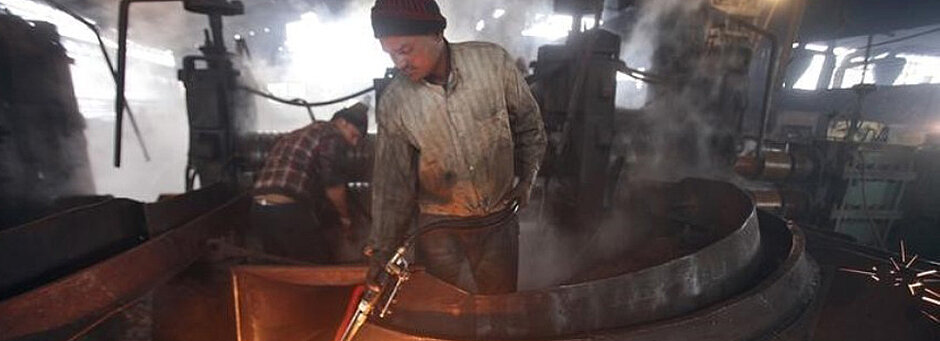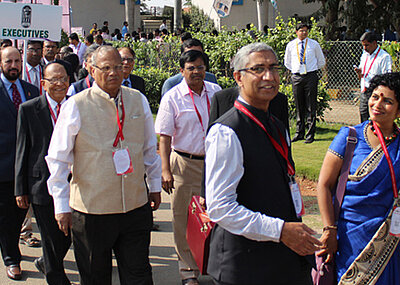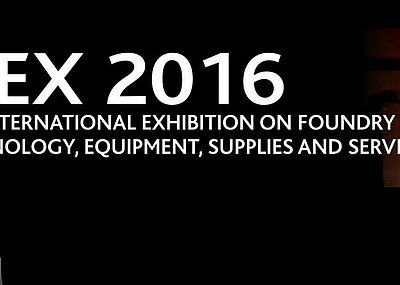India is the third largest manufacturer of metal castings globally, producing approx 10 million tonnes of castings in various metals
The Institute of Indian Foundrymen (IIF) is the apex industry body promoting the competitiveness of India's foundry industry. There are about 5,000 foundries in India largely in the MSME category.
The foundry or metal casting industry is a key component feeder for the various sectors such as auto, auto components, railways, agro, tractors, textile, cement making, electrical machinery, earthmoving machinery, power equipment, defence equipment, and aero and space industry its sustainable growth has become more important today than ever before given the emphasis of the government on "Make in India".
India is the third largest manufacturer of metal castings globally, producing approx 10 million tonnes of castings in various metals such as grey iron, ductile iron, steel and aluminum alloys for various applications valued at approx $18 billion. Exports amount to 12-15 per cent of this value. However, there is potential and need to do more and become global force.
IIF has submitted its pre-budget proposals to the government and expects the following interventions from the government for supporting manufacturing:
1. Taxes and Duties
India being a developing nation does not generate enough scrap and it needs to be necessarily imported. It is proposed that the import duties on major raw materials used in foundries such as scrap, should be reduced, whereas the export of raw materials without value addition must be discouraged by imposing export duties on raw materials to promote value addition. This becomes critical as most competing countries allow import of scrap duty free, resulting in cost disadvantage to Indian manufacturers. SAD on scrap should be abolished.
2. Excise Duty
Excise exemption limit for MSMEs was fixed in April 2007. Since then, the cost of inputs like power, labour, raw materials and other operational costs have gone up by more than 100 per cent. Hence the present exemption has become inadequate and there are pressures on working capital.
It is proposed to increase the excise exemption limit from present Rs 1.5 crore to Rs 2.5 crore. This will help the MSMEs to increase their manufacturing outputs by allowing them more working capital in hand.
3. Technology Upgradation Fund
The foundry sector needs to upgrade tremendously to be able to meet the projected demands of various sectors and be globally competitive. However, due to low margins and increasing costs of various inputs such as manpower, electricity and increasing environment compliance costs, the industry is not able to invest in new productive and greener technologies, which has become the need of the hour. There is urgent need to promote the investments in productive and green technology and for scaling up production for improved productivity and for sustainable growth in the sector.
Hence it is proposed that the foundry sector specific technology upgradation fund of Rs 1,000 crore may be set up for providing soft loans to foundry units to help promote investments in green & productive technologies.
4. Export Promotion - Revisiting MEIS Scheme
Since the withdrawal of the DEPB scheme, the benefits to exporters have tremendously gone down and exporters have suffered loss of approx 5 per cent by way of lost incentives. It is proposed that MEIS scheme may be revisited as the benefits to exporters have tremendously come down ever since the withdrawal of DEPB scheme. The benefits for the castings should be changed from 2 per cent to 5 per cent and it should be applicable to all categories of countries including category "C" countries which are not included for benefits as per existing MEIS scheme.
5. Credit Linked Capital Subsidy for MSMEs
At present a subsidy of 15 per cent is available to MSMEs for investments in new technology for tech upgradation for defined technology with upper cap of Rs 1 crore per unit. These limits were decided about 9 years back and are now not adequate due to rise in the input costs by approx 100 per cent. It is proposed to increase rate of subsidy to 20 per cent and upper cap to Rs 2 crore per unit.
6. Skill Development
It is proposed that the government may constitute a committee of representatives from Ministry of HRD, DGET, the Institute of Indian Foundrymen, NIFFT Ranchi, and the CII to review the infrastructure and curriculum needs of NIFFT Ranchi and ITI and align it with the foundry sector's needs. It is also proposed to set up two modern national institutes of the level of NIFFT, Ranchi. One should be in southern India and other in western part of India. There is also need to mandate introduction of foundry technology stream in govt colleges, polytechnics, and ITIs near major foundry clusters.
7. Simplification of Procedures
It is recommended that the process for environment clearances/consent to operate should be made simpler and on the single-window model. The consent to operate should be treated as final clearance. Validity for consent to operate must be for at least 5 years for Red Category and 10 years for Orange category industry.
Partner
Foundry Corporate News
Topic Pressure Die Casting
Budget 2016-17: Foundry Sector's Expectations
Lesedauer: min
[0]





